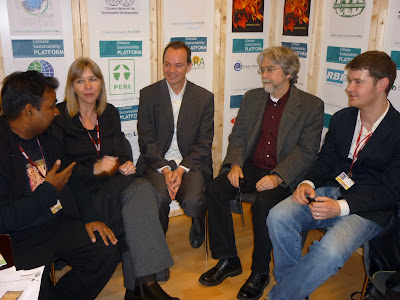by Uchita de Zoysa (Convener - Climate Sustainability PLATFORM)
Unsustainable consumption and production patterns are a primary cause of climate change and poverty. Yesterday, the Climate Sustainability PLATFORM rallied a diverse group of stakeholders at the KlimaForum in the session titled “Sustainable Consumption and Production Framework”. For the past ten years the UN Marrakech Process has been trying to formulate a 10 year Framework of Programmes (10YFP) on SCP and they are lost once again, and have failed to even get any attention of the UNFCCC. We cannot wait for the different UN agencies to find common interest on issues of the world, therefore the independent sectors may have to develop a relevant framework that guides the world towards Climate Sustainability.
Jeffery Barber, a long time sustainability campaigner from the USA, delivering an introductory presentation, pointed out that the 2002 UN World Summit on Sustainable Development called for the creation of programmes to support the efforts of groups and initiatives around the world changing production and consumption patterns. This will be a welcome and useful contribution to the sustainability movement when the UN finally gets around to developing these programs. Unfortunately, there has been ongoing confusion about the nature of this mandate and the UN's role regarding the "framework" for these programs. Some believe that the UN's purpose is to play more of a leadership role, guiding us along the path to sustainability. However, Barber maintains, the WSSD mandate was specifically to support the work of those who have been taking the lead on sustainability all along -- by the practitioners, the community organizers, the educators and socially responsible entrepreneurs and networks who answer directly to the public interest. The UN has an important role to play in supporting national and regional efforts to create a better quality of life for everyone, he said, but it is the movement of people and their initiatives around the world that will lead the way.
Bas de Leeuw, former head of consumption at UNEP and now Executive Director of the Dana Meadows Sustainability Institute in USA joined the PLATFORM dialogue to share the growing call for action. He said that it is high time that a clear framework of programmes is presented, and pointed to the untapped potential of systems thinking for better achieving the sustainable consumption and production agenda. Individuals need to be empowered to “be the change in the world they want to be.”
Prof. Victoria Thoresen from PERL, a large European network of sustainable consumption research was more optimistic that different UN programmes could be made better. She said, “We cannot discard the programmes available, but make sure that they are better. However, it is important that we build a global movement based on the emerging common principle of sustainable consumption and production.”
Gopal Jain from India could not resist stating that the wasteful lifestyles in the West continue to drag all of us in the world towards destruction. He said, “We come from cultures that do not throw away, but reuse in ways that the lifecycle of the resource is maximised.”
Gail Karlsson, an environmental lawyer from New York joined in the dialogue, saying that reducing wasteful consumption in the US is critical for a sustainable world, in addition to adverting to people all over the world whose basic needs are not being met. She stressed that climate-related funds to resource clean fuels or technologies and empower women would be an important first step to reducing greenhouse gas emissions and promoting sustainable livelihoods.
Responding to this point, Bruce Davison from the UK representing Global Sustainability Solutions said that a challenge for stakeholders developing sustainable consumption and production patterns is the time taken in decision-making. Decisions taken over a longer time-frame can avoid inefficient expenditures on cheap purchases that have limited usage-time. Likewise, producers taking considered decisions would avoid cost-risks associated with short-term profits.
Flora Ijjas, an environmental economist from Hungary introduced the concept of “virtual water” and how a water footprint”, provides a new perspective on climate change. For example, water efficiency labels based on the virtual water concept could be used to inform consumers about how much water they are really consuming and allow us to respond responsibly in the face of growing demand for water.
Looking more into the future, Ambreen Waheed, Executive Director of Responsible Business Initiative Pakistan, emphasized the need to motivate young people to become the catalyst for bringing about a drastic transformation in lifestyles to more sustainable ones by highlighting role models that are “hip” but do not espouse wasteful lifestyles. It would a long process, but is the only way towards permanently shifting away from the present destructive ways.
So, what are all these people from around the world asking? Development? No, they say. It is happiness that they want for the future generations. For that they demand that wellbeing of all people on earth is first ensured.
(send comments to uchita@sltnet.lk)
This article was originally published in OUTREACH a daily newsletter published by Stakeholder Forum


No comments:
Post a Comment